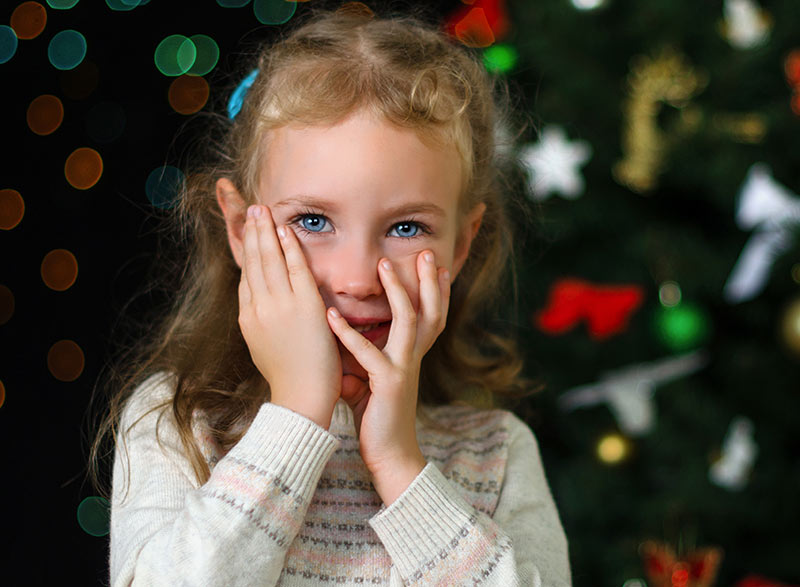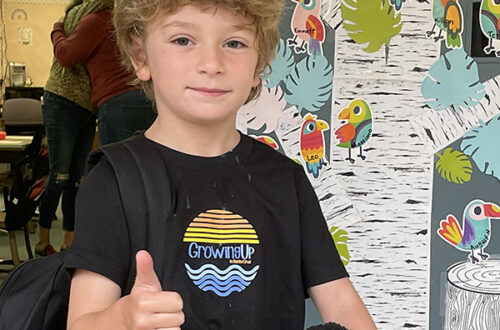Over the years, I have been privileged to teach with and to hear several talks given by one of our local treasures, Julie Olsen Edwards, Cabrillo College’s retired early childhood education faculty member, author, editor, and diversity/equity consultant.
One of her talks regarding families and the holidays lives on in my work with families of young children. Julie’s wisdom is always golden and, paired with Positive Discipline’s practical tools, I developed solid advice for parents that I give out every year to help ensure connection and magic in children’s homes.
What Memories Do We Want To Pass On?
Holidays and ritual celebrations can be a time of change from the relentless, busy pace of everyday life. It offers a pause, a time to remember what’s important, and the opportunity to create lifetime memories.
In a season of wintery darkness, the many celebrations of light from the Hindu holiday, Diwali, to the Solstice, to Hannukkah, to Christmas, to Kwanzaa, and many more, are meant to lighten us up. Sadly, too often many factors end up creating more darkness rather than upliftment in our lives.
These factors can include the expense and stress of long-distance travel with young children, cultural and familial expectations and obligations that parents struggle to meet, the financial burden and time-consuming task of gift giving, pressure to cook and serve large meals and baked goods special to the holiday, hosting out of town family guests or staying at non-child-friendly homes of relatives, decorating the home or purchasing holiday clothes, etc. Parents under pressure with too many obligations equals stress.
One role of parents that is not often talked about is the role of creating childhood memories for their family. What memories would you like your children to have? A holiday where their parents are quick to anger and stressed out? Or a holiday where their parents are relaxed, smiling, and enjoying time together?
Take a moment to recall a favorite childhood holiday memory or, if you did not have happy holidays to remember, think about what would you have liked to have happened. Picture the scene. What was happening? What was special about it? What was the feeling?
The formula for making these same magical holiday memories happen for your children is to prioritize and edit.
Make Holiday Plans from the Inside Out, Not the Outside In
Begin by looking inside yourself and get clear about the aspects of the holiday that are very important to you and create a joyful feeling. Your list may include:
1) Time with relatives far or near
2) Cooking and eating special meals together, or baking holiday treats
3) Participation in religious or spiritual celebrations with your community
4) Taking part in acts of service for the community
5) Creating a festive home
6) Exchanging special gifts for loved ones
7) Participating in your own unique holiday family traditions and activities you’ve created
8) Writing and sending out holiday cards
9) Hosting a yearly holiday celebration in your home for friends and relatives or attending the many work parties and parties with neighbors/friends/family
10) Staying home for the holiday, going at a leisurely pace throughout the day, inviting family to stop by rather than venturing out
To try and do all of these things and more is a formula for stress when parents are in a constant state of being stretched financially and emotionally. Stressed-out parents create stressed-out children. If you look to the outside world’s holiday expectations, (your family and culture), the holiday can become a burden. So start by searching inside your heart for your guidance.
Ask yourself what you want to do, not what you should do. After you have picked 2 or 3 things on your list that make the holidays meaningful for you, prioritize them. Make sure they happen. And then…edit out the rest of the list as painful and as hard as that might be.
Strategies for Letting Go Using Positive Discipline Life-skills
Positive Discipline is a practice of using relationship tools and skills that apply to not just the parent/child relationship, but to all relationships in your life. Here’s a list of these tools to aid in creating an enjoyable holiday season.
Boundaries: Create boundaries for your family. Practice a kind and firm, “No, but thank you,” attitude when invited to too many evening events that disrupt routines and bedtimes, too many surgery treats that inspire out-of-balance mood swings, or too many miles to travel with travel-challenged children.
You are the one who will have to manage the fallout from over-taxing your children, so you get to set the boundaries that work for you. Enjoy the extra fun activities that holidays bring, but give yourself permission to have limits, knowing what is best overall for your children.
Empathize: Be prepared that some family members may be disappointed in your choices. Empathize with their wish for you to meet their expectations. There can be pressure to parade your children to all the relatives’ houses who want to see them, to stay up late until a family member arrives at the festivities, or to have your children hug and kiss relatives they barely know. It is often all done out of love. But you do not need to give in to this pressure knowing it will create challenging results. “I know you want us to stay, and I wish we could. We love you all and we need to keep to a healthy sleep schedule for everyone’s peace of mind.”
Solutions: Keep a solution mindset. Be flexible, but not so flexible that you lose your healthy boundaries. For example: instead of complying with relatives who want hugs and kisses from your children who are shy or reluctant, offer the idea of blowing kisses from afar or a high five. Instead of staying at family gatherings that are overstimulating for children (who are an easily overstimulated population), go for a limited time and gracefully bow out. Instead of over-extending yourself financially due to gift giving or travel, ask family members to do simple gift exchanges or to invite them to come to you so you can relax in your child-proofed home. Get creative with your solutions; there are so many win-win options for every problem.
Self-care: Parenting, like any relationship, includes care of others AND care of the self. Thus, limit your holiday commitments and family activities for your well-being. Create pockets of downtime away from the excitement for your children and yourself. Care of yourself IS care for your family
Less is more during the holiday season. Give your children the gift of low-stress holidays by consciously making choices to create magical and meaningful moments for them to remember all of their lives. Happy (truly happy) Holidays!
Colleen Murphy is a credentialed teacher, a Certified Positive Discipline Educator and Trainer at Positive Discipline Community Resouces (www.pdcrcc.org), a parent coach at fromtheheadtotheheart.com, and in healthy relationships with her two grown kids.
Want more personal support around the holidays? Join Colleen for the online series Keeping the Joy of Parenting during the Holiday Season. Dec. 6, and 13th. 4 pm-5 pm. Send a message with your name, child(ren) age(s), and city of residence to PDCR’s text-only line to receive a Zoom link or recording if you can’t join live: 831-292-4088. Use this number to request other future free programs, or to request heart-to-heart private parent coaching.







